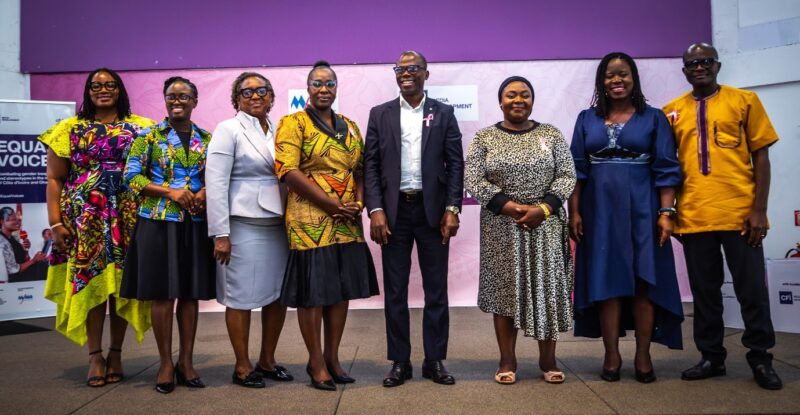Participants in a conference on media and women’s empowerment in Ghana have called on the media to champion the implementation of Ghana’s Affirmative Action law, which was recently passed in July 2024, cautioning against complacency, as the passage of the law is only a first step towards gender equality in the country.
The media was particularly admonished to take up a lead role in the implementation of the law.
To effectively do this, participants jointly agreed that it is important for the media to first and foremost, demonstrate leadership through exemplary reforms that dismantle gendered stereotypes against female journalists that have long existed within the media space.
These views were expressed during a panel discussion on the theme: From Policy to Action: Advancing Gender Equality in the Ghanaian Media through the Affirmative Action Law.
The panel discussion was a key highlight of a conference organized in Accra on October 30, 2024, by the Media Foundation for West Africa (MFWA) as part of activities under the ‘Equal Voices’ project. The conference which was under the broad theme; Media and Women Empowerment in Ghana.
The ‘Equal Voices’ project is jointly implemented by the MFWA and the French media development agency, Canal France International (CFI), and it is aimed at combatting inequalities and stereotypes based on gender while promoting women at all levels of responsibility in Ivorian and Ghanaian societies through gender-aware and gender-sensitive media practices.
The conference in Accra brought together stakeholders such as gender activists, state actors, civil society representatives, development partners and journalists, to deliberate on the media’s role in promoting gender equality in the media ecosystem and society at large.
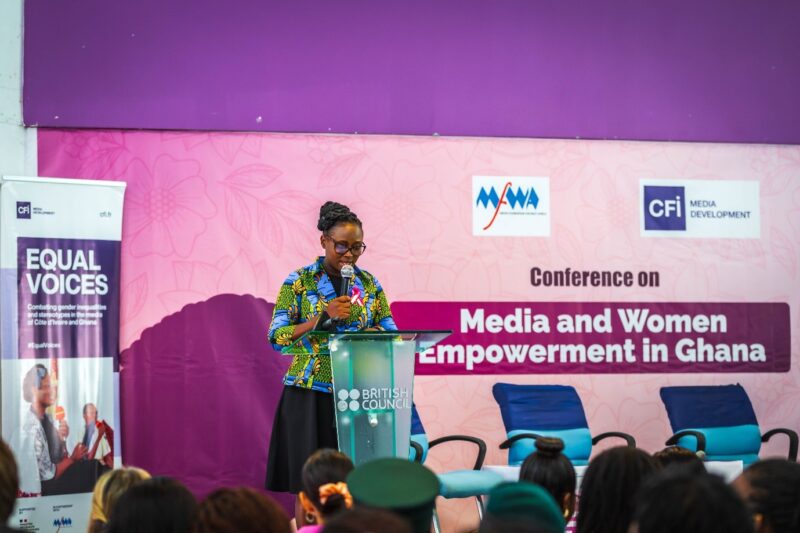
Madam Vera Karikari Bediako, Deputy Director at the Ministry of Gender speaking on behalf of the Minister
In a speech read on her behalf by Madam Vera Karikari Bediako, Deputy Director at the Ministry for Gender, Children and Social Protection, Darkoa Newman, made the first rallying call for the media to lead activism for the implementation of the new gender law.
“The Ministry of Gender, Children and Social Protection, is hopeful that the passage of the Affirmative Action laws will address the gender imbalance across all sectors, including the media space. As a matter of fact, we see the Affirmative action law as the highest recognition and inclusion of women in decision-making, and implementation (of the law) needs all hands on deck for maximum results. I wish to use this platform to call on the media fraternity to lead in the sensitization process now that the Bill has been passed into law; the implementation process can only be effective when we all support this noble cause,” she said.
The Minister added, “As a Ministry spearheading the gender equality agenda in Ghana, we strongly believe in the transformative role the media can play in achieving gender equality by creating gender sensitive and gender transformative content and breaking gender stereotypes and also by challenging traditional, social and cultural norms and attitudes regarding gender perceptions both in content creation and delivery.”
Media must first self-purge
To do this effectively, she said, the media has to first purge itself of existing stereotypes and inequalities against women within the media itself.
“While we have made strides in recent years in gender equality, there is still much work to be done. Women are mostly underrepresented in media leadership roles and often face discrimination in the types of roles they play or the stories they are asked to cover.”
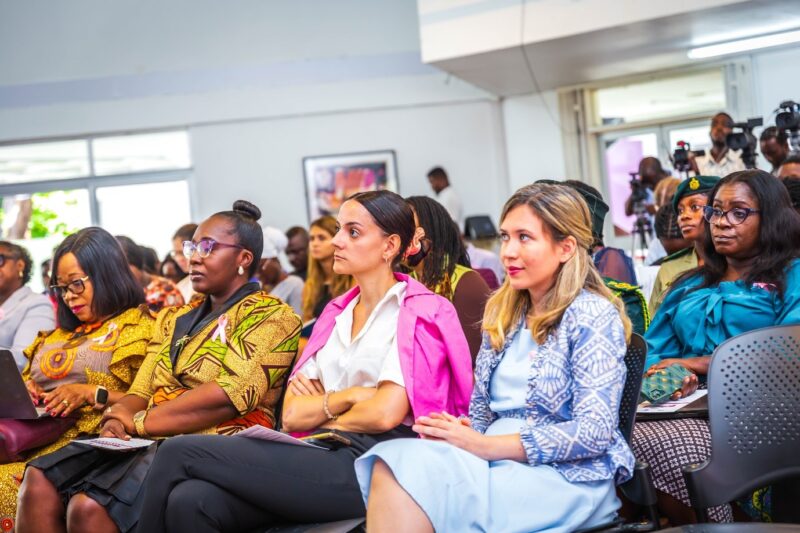
“If we are to achieve a balanced representation, then our media must work to dismantle these barriers. The media today, from traditional legacy media to online media, still hugely influence our perceptions and ideas about the roles of girls and women in society,” she said.
Battling old ghosts
The Gender Minister’s views and call to action were re-emphasised by the keynote speaker at the conference, Prof. Abena Animwaa Yeboah-Banin, who is the Head of the Department of Communication Studies at the University of Ghana, Legon.
She spoke on the topic; Empowering Women in the Ghanaian Media: Progress, Trends, Challenges, and Prospects. Beyond the fact that these discriminations against women exist, she likened their manifestation to the existence of old ghosts that have refused to rest.
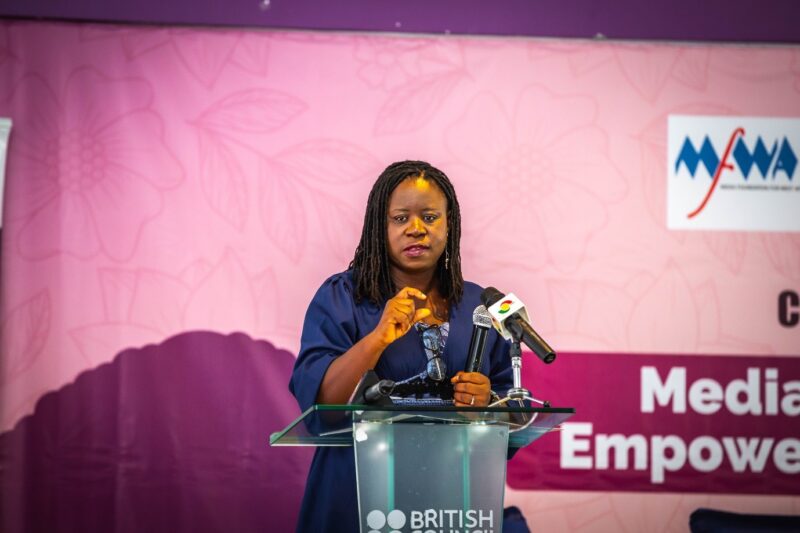
For instance, she said, available data shows that in the 2000s, women accounted for 24 percent of bylines for stories, while men accounted for 76 percent. By 2020 the percentage of women’s bylines had increased by only 6 percent to 30%.
Again, she said, in terms of numbers when it comes to presenters of media content, there were only seven percent males in the 2000s with females accounting for 93 percent. But the more current statistics show that the percentages of male and female presenters have almost evened out with 49 percent of the presenters now being males.
“So, in the (roles) in which the men were dominantly represented, the numbers haven’t evened out but for the ones in which women were leading, these have evened out, almost reaching parity.”
Research, she said, continues to show that women journalists tend to be relegated to covering so-called “soft” beats as against the “hard” beats, which lead to career progression.
Again, the number of women who occupy managerial positions in media organisations continues to be drastically few compared to males.
Prof. Yeboah-Banin pointed out that women now have a more diversified expanse of roles in the media space, but they are not in charge of media and are not really in decision-making roles.
For the media to effectively champion the application of the Affirmative Action law, she said that it has to first purge itself of all of these statistically confirmed gender inequalities within the industry.
We won’t develop by leaving women behind
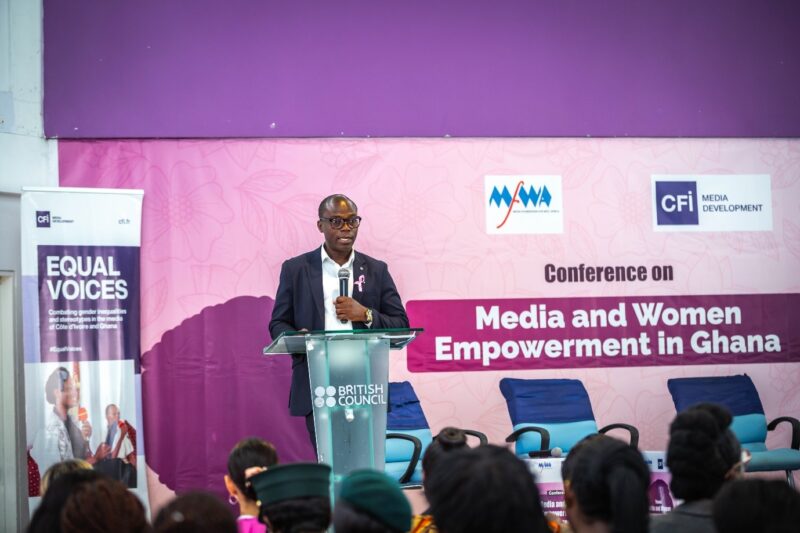
On his part, the Executive Director of the MFWA, Mr. Sulemana Braimah, said that society cannot develop if age old patriarchal norms that treat women as unequally continue to exist.
“Overcoming our challenges will require that the efforts of all, the voices of all, the ideas of all and the power of all are harnessed. Building better societies and communities requires not only hard work, discipline and commitment, but more importantly, equity and inclusion.
“We certainly, therefore, cannot have a better Ghana by continuing the old and backward practice of being dominated and overwhelmed by the voices, the power and ideas of only men. Any thought of rebuilding and confronting our challenges of today without a demonstrable effort to move away from exclusion to inclusion is a false start and certainly will represent a classic case of how not to fix a broken system,” he said.
According to Mr Braimah, the media, as it functions now actually enables disempowerment of women. “One key enabler of women’s empowerment is the media; the media remains the most powerful tool for information dissemination, for amplification of voices and for agenda setting. Sadly, the media in Africa and Ghana for that matter are among the culprits of women’s disempowerment. Women’s voices make up less than one-quarter of those whose views and voices are heard in the media and news spaces. Women make up just about 22 percent of news sources in Africa; the situation in Ghana is certainly not different.”
He continued; “Within the digital realm, things are not different, and I think it’s even worse. In several countries in West Africa for example, less than 10 percent of women have regular access to the internet. This is certainly not right, and cannot lead the path towards rebuilding a better Africa and a better Ghana."
Women’s rights are human rights
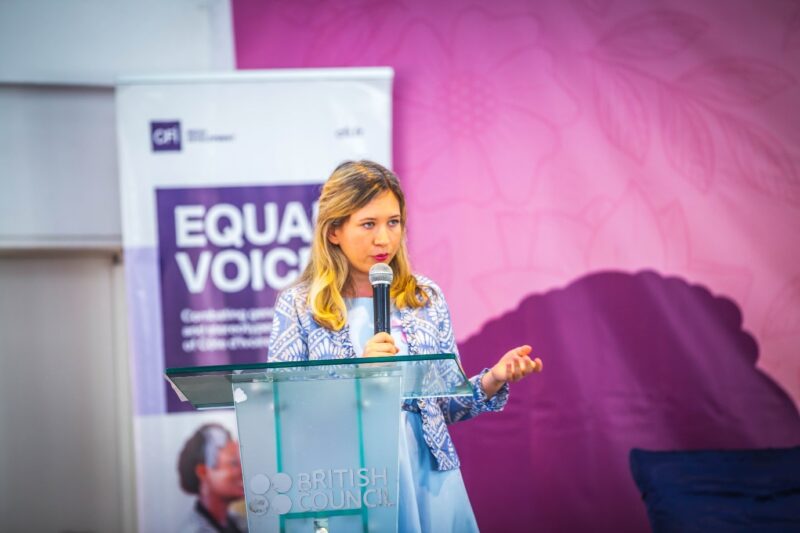
Representing the French Embassy in Accra, Madame Marine Hayem, the Cooperation Attachée, said it is important for women to be represented at decision-making forums because they carry insights and concerns that represent and affect society as a whole.
“When women are involved as journalists or analysts, they bring unique insights that reflect the concerns of a large part of the population,” she said, adding, “We need equal voices, to challenge stereotypes against women.”
Roadmap for gender equality in media on course
Meanwhile, resource persons on the Equal Voices project, reported that they are on course to deliver a roadmap document to guide the countering of gender inequality in the media by February 2025.
Dr. Charity Binka, Executive Director of Women and Change (WOMEC) together with Dr. Aurelia Ayisi, a lecturer at the Department of Communication Studies at the University of Ghana, are the consultants on the project, presented a few highlights of what has been done so far.
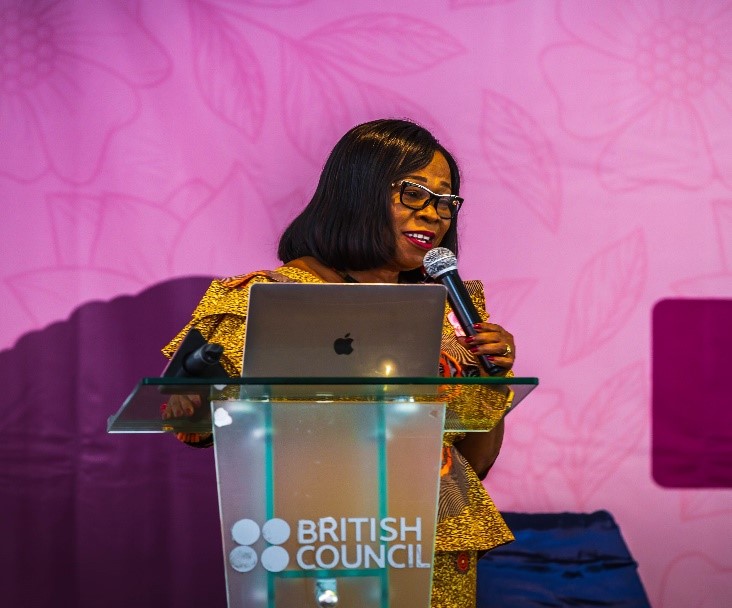
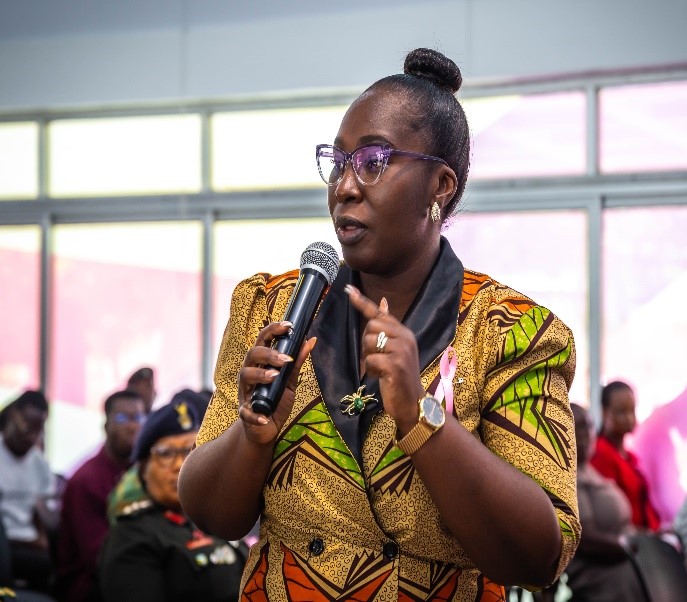
She explained that the document, when completed, will be the outcome of dialogues that were held with four strategic groups from June to September 2024 – Academia, gender-focused CSOs; policymakers and media associations, and journalists and media practitioners.
Recommendations
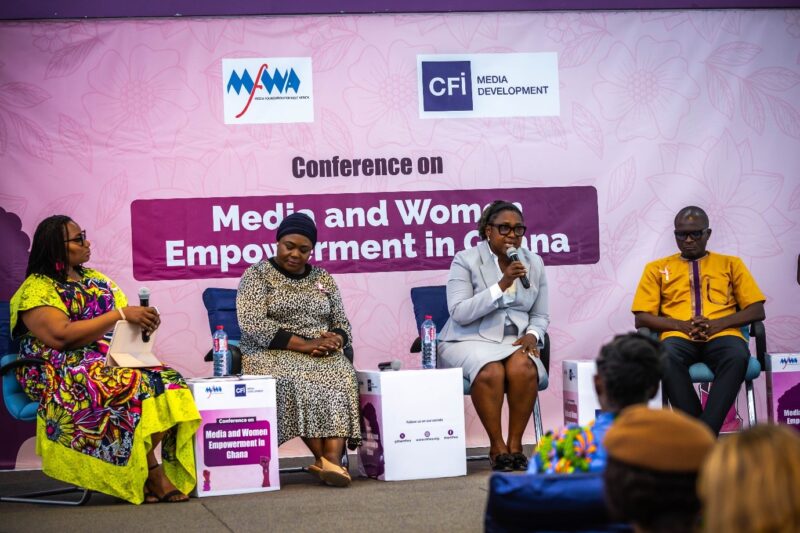
Some recommendations that were made during the panel discussion are as follows;
- Media organisations that report gender-sensitive stories should be recognised and awarded. This will not only highlight the need for attention to these issues but encourage the media in general to give attention to gender issues.
- Employees of media organisations were encouraged to form worker unions which can exert stronger voices in favor of gender equity. This way, female journalists can leverage the strength of the unions to assert their employment rights with their media organizations.
- Gender-focused CSOs should build healthy partnerships and alliances with media organisations so that the platforms of the media organizations.
- All media organisations should have clear policies against sexual harassment and gender-based violence.
- It was recommended that civil society should push for policies on fair recruitment, promotion and remuneration practices.
- CSOs should also target media owners and managers for gender socialisation and develop and push for the adoption of workplace equal opportunity, and anti-discrimination policies by media.
- CSOs were encouraged to create specific, realistic and measurable action points for media organisations to promote gender mainstreaming.
- For regulators, it was recommended that make it mandatory for organisations to report on gender equality actions and achievements in regulatory reports.
- Regulators were also urged to push for deliberate and affirmative recruitment practices on governance boards citing Affirmative action law.
- For the academic community, a recommendation was made to strengthen collaborations with industry to empower evidence-led action.
Latest Stories
-
I’m not too old to be ignored, I’ve sacrificed for NPP – Kufuor laments exclusion
29 minutes -
Sinner beats Alcaraz in four sets to clinch Wimbledon title
29 minutes -
MTN Ghana champions youth mentorship drive at UG with focus on digital skills
45 minutes -
Kufuor demands respect and inclusion; laments marginalisation by NPP
57 minutes -
Black Queens outstanding allowances has been paid – Ghana’s Ambassador to Morocco
1 hour -
Mobik Energy CEO raises alarm over Tarkwa’s disappearing rivers and environmental neglect
2 hours -
Former Nigerian President Muhammadu Buhari dies in London
2 hours -
Hard work, not betting, will secure your future -Mobik Energy CEO advises Tarkwa Youth
3 hours -
GIA boss debunks claim payment misconceptions as ‘Street Insurance Campaign’ educates public
3 hours -
Asempa FM’s Ekosiisen supports renal patients with GHS100K, urges gov’t to absorb full cost of dialysis care
3 hours -
WAFCON 2024: We have ‘good options in attack’ – Bjorkegren backs Queens to improve goalscoring
3 hours -
Vice President convenes strategic stakeholder meeting on Women’s Development Bank
3 hours -
Bawumia visits Hawa Koomson after violent attack during Ablekuma North rerun
3 hours -
Bawumia visits assault victims in Ablekuma North rerun; pledges support
3 hours -
Mahama charges Transport Minister and Attorney-General to resolve unauthorised shipping charges
3 hours

